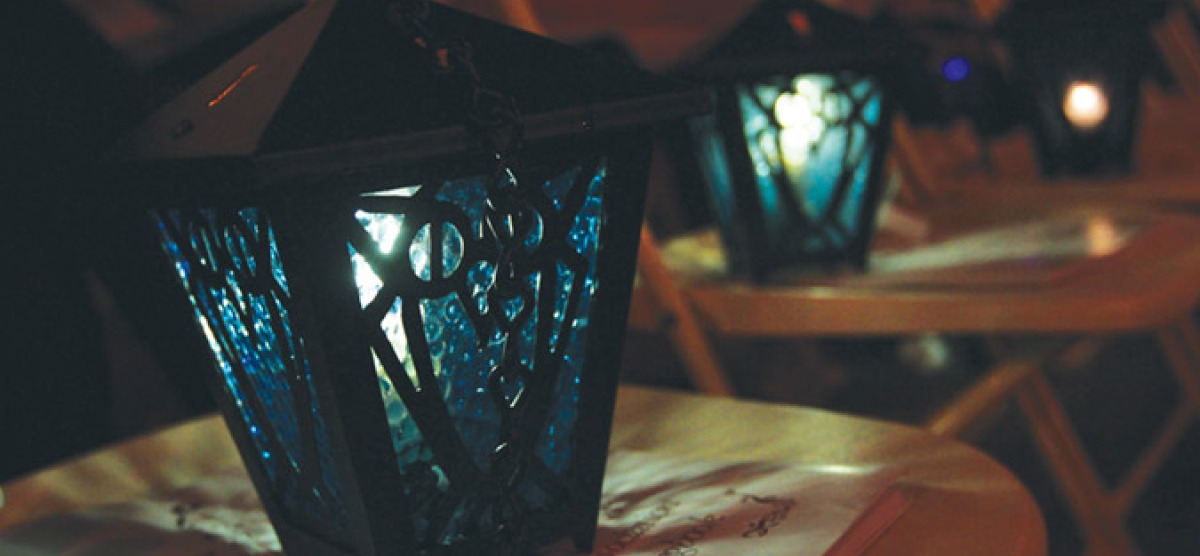
On Bryn Mawr's Landscapes
Alumnae/i celebrate the physical—and emotional—space of Bryn Mawr.
“Bryn Mawr is my standard for beauty,” says photographer Paola Nogueras ’84, who has created a voluminous visual record of our alma mater in publications for prospective students and alumnae/i. “Sunken Garden, Taft Garden, the spaces behind Goodhart—I know every nook and cranny, and I’m still discovering beautiful places.”
Though her hometown of San Juan, Puerto Rico, is notably lush, Nogueras was staggered by the burst of cherry and apple blossoms her first year on campus. Now, looking back on her career, she says the technical trial of capturing Bryn Mawr—shooting Lantern Night in the dark or framing the frenzy of the Maypole/hole dances amid flying students—is a cinch compared to the challenge of translating the College’s significance. And like any Mawrter, she’s most critical of work she’s done on a subject she knows intimately. “I’ve taken so many pictures,” she says. “But I’ve never been able to impart all the meaning Step Sing had for me.”
Bryn Mawr is a site-specific experience. For alumnae/i, built structures like the Senior Steps conjure ceremonies that are invisible—even incomprehensible—to the uninitiated. “I love the halls of Taylor: the golden wood, the way the sunlight streams through the large windows, connecting the inside and outside in every season,” says Jessica Bass Kirk ’91. An English major, she spent much of her time in English House, where “going up the stairs to your classroom, in the space where faculty had offices, felt like joining the community of scholars.”
Both women speak to a feeling familiar to alumnae/i: the parallel landscapes we occupy as students—the past and present, the immediate and eternal—merge only rarely, such as when we perform our peculiar traditions or in the pause Reunion compels.
As Kirk reflects, “I find Senior Row such a compelling landscape to contemplate, which we didn’t have time to do when we were here, hurrying to class. Our memories of that space are mostly of May Day: garlands in our hair, rolling hoops, trampling mud—the whole merry, cacophonous experience.” Revisiting the row with her daughter to “store a quiet moment” after Reunion last year, Kirk was struck by the “strong and vulnerable” landscape she saw through her camera lens. She explains, “These majestic trees have been here since the College was founded. But for Bryn Mawr’s commitment to this arboretum, they could be chopped down tomorrow for firewood. The trees endure much like the stone buildings do—while we come and go with our present-day concerns, sharing time with them.”
Bryn Mawr’s intellectual and emotional effect is by design, “creating an environment that is at once comforting and challenging,” says architect Daniela Holt Voith ’76, whose own firm specializes in designing educational environments. “The inner sanctum created by the walls of the Pems, Rock, and Goodhart is clearly saying, ‘We’re important. We do hard work here.’ The architecture creates space for making intellectual connections. I’ve tried to replicate this idea over and over again in my campus planning and architectural response to campuses.”
Voith had planned to study anthropology and architecture at the University of Pennsylvania, but her mother’s death during her senior year in high school made her reconsider. “At Penn, there was nobody who would take care of me,” she recalls. Investigating the possibility of enrolling at Bryn Mawr but majoring at Penn, she found herself seated in Dean McPherson’s office, with its imposing desk and elegant oriental rug. “She handed me an onion-skin carbon copy of Barbara Miller Lane’s proposal to start the Growth and Structure of Cities program, and I decided right there,” Voith says. One of the first Cities majors, she later developed and taught Bryn Mawr’s design studio program.
Echoing fellow alumnae/i, Voith adds, “Of course, you can’t divorce a physical space from the emotional space. Walking through halls where others have walked before you, knowing that you’re part of something bigger than yourself, has always been inspiring and comforting to me. At Bryn Mawr, I had teachers and friends who made a huge impression. Those people are the reason the buildings and spaces mean something to me.”
Our relationship with the College affects how we perceive it. Bryn Mawr is the physical campus of cloistered buildings run through with graceful paths and an allée of maple trees, the intellectual landscape cultivated within its gothic halls, and significant architecture earning designation as a National Historic Landmark. For alumnae/i, Bryn Mawr is both monument and memory palace, keeping our college years.
Published on: 02/07/2020